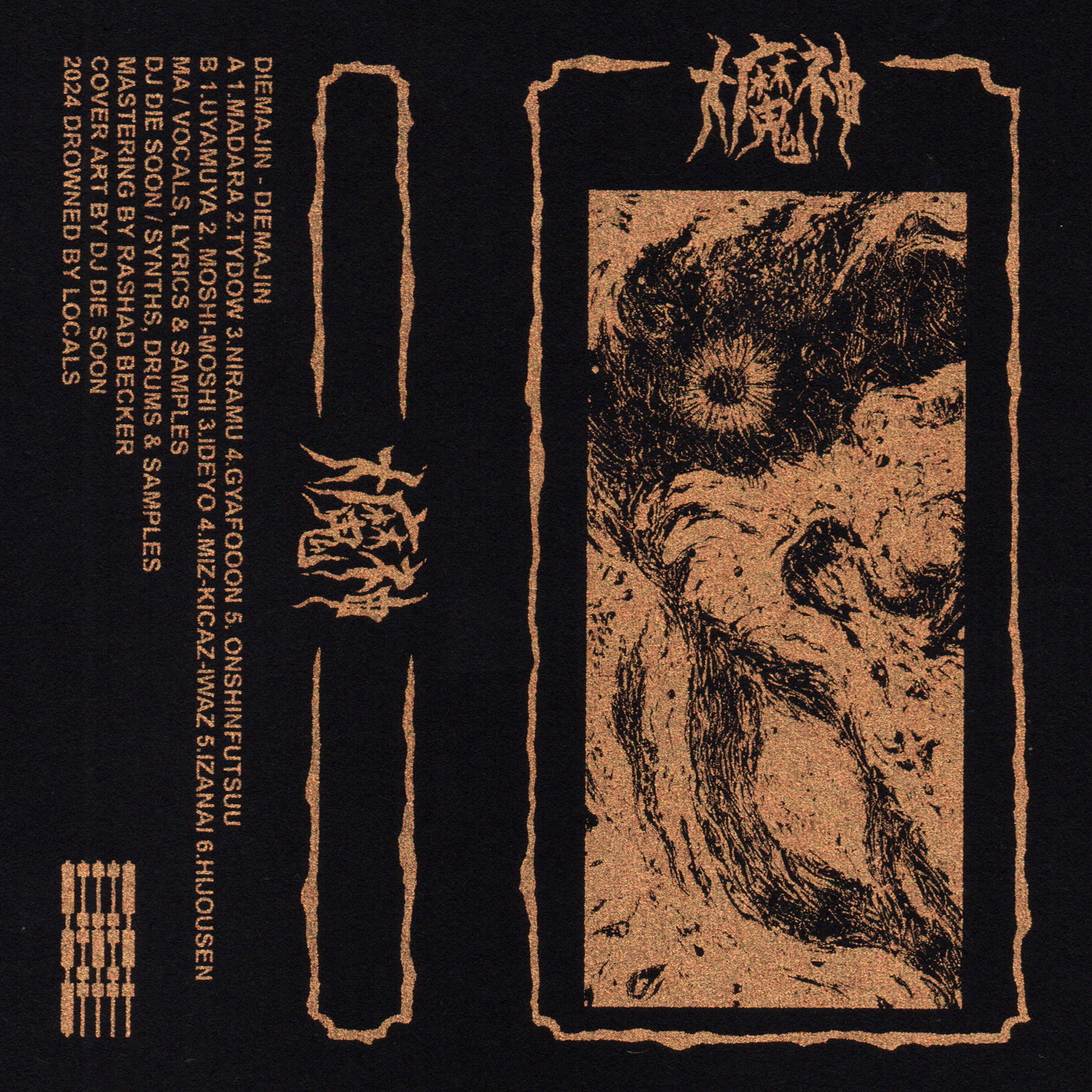
DIEMAJIN is the duo of Berlin-based producer DJ DIE SOON (Daisuke Imamura) and Tokyo-based vocalist MA. Their self-titled debut is equal parts scrambled hip-hop, simmering noise and spectral Tokusatsu soundtrack. A set of cursed beats and possessed raps inspired by Japanese sci-fi and supernatural-horror films from the 1960s.
The pair, both originally from Japan, first collaborated live at an event in Berlin organised by Morphine Records in 2019. But the eleven tracks on their self-titled debut were made by swapping beats, sounds and acapellas across the internet. Editing, arranging and degrading them into the collection presented here.
DIEMAJIN’s theme is Japanese movies from the sixties. Especially influential is Daimajin (which the duo’s name references alongside being a loose portmanteau of their solo monikers). A 1960 film about a giant warrior god, Daimajin falls under the Tokusatsu umbrella – live action movies which use practical, ‘handmade’ special effects, whether monster suits, miniature model cities, or everyday objects hi-jacked into props.
“I’m interested in how they made those movies. I think how my music is made is very similar,” explains MA. “I use the sound of my life when I make music. Hitting the table, the wind blowing. I think it’s like how the flying saucer in the movie was made by an ashtray. Some of the sounds in “UYAMUYA”[track six on DIEMAJIN]were actually made using an ashtray.”
Embedded in Tokyo’s hip-hop scene, MA’s distinct rapping has also drawn comparison with ancient Japanese vocal methods. His previous releases and collaborations showcase a triumphant combination of extended technique and liquid flow. “I do that without thinking,” MA explains. “It’s like Michael Jackson’s “POW!” or heavy metal’s shout. I don’t know why I do that. Burst out. Energy flow.”
Those instinctive vocal gymnastics are still present with DIEMAJIN, most notably in the gurgling start to “UYAMUYA”, but they’re reeled into far more ominous, apparitional ends. MA rants and cackles over DJ DIE SOON’s coarse electronic tones and incessant minimal patterns. The producer’s mutated synths and warped samples embrace a more textural, less explicitly rhythmic terrain than his recent productions. Beats do come in, such as on “GYAFOOON” or “MOSHI MOSHI”, but they serve to amplify rather than release the scuffed and eerie gait seeping through the album.
Daisuke mentions two more movies, Jigoku and Kwaidan, which ventured into folk-horror terrain but used similar production techniques to Tokusatsu, as also being influential on DIEMAJIN. While DIEMAJIN don’t sample from these films, they emulate their ambiences. It can be heard in the heavy compression through the album and the cracked yet vivid space the voice and sounds erect. “These films have a special texture, they’re beautiful despite the old-fashioned technologies and processes they used to make them,” Daisuke continues. “But also, when you see these movies now, they’ve really degraded with age. When someone screams, the sound distorts.”
It is this quality: a scream from the past becoming distorted through the medium of its transmission, perhaps, that DIEMAJIN most concretely channel in their music. A sense of some cursed broadcast leaking broken and mangled into the present. There’s a long thread connecting hip-hop to cinema. From Wu-Tang Clan’s kung-fu movie samples through to the Horrorcore of Geto Boys and Gravediggaz. DIEMAJIN plug into this history but bring in their own reference points. In doing so, they fixate on the disturbing mechanics of foreboding itself. Slow-building disquiet rather than shock and gore, they leave a mark far more pervasive than a momentary jump-scare.
Credits:
Vocals, Lyrics and Samples: MA
Synths, Drums and Samples: DJ DIE SOON
Master: Rashad Becker
Cover Art: DJ DIE SOON
Text: Daryl Worthington
Catalog no.: DBL32CT

